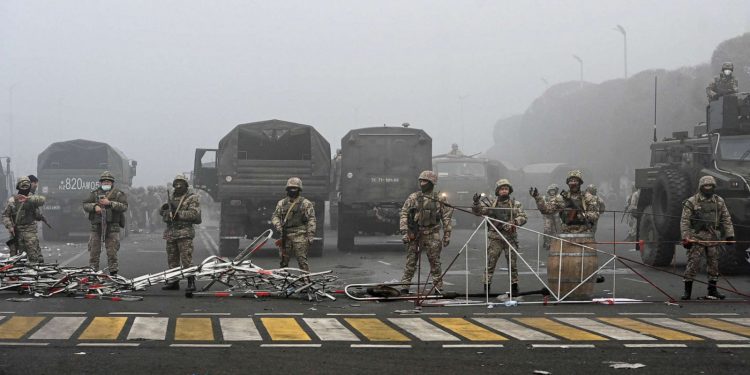Over 2,000 Russia-led troops began withdrawing from Kazakhstan on Thursday after being deployed when peaceful protests over an energy price hike in the Central Asian country turned into unprecedented violence claiming dozens of lives.
The decision to despatch peacekeepers was a first for the Moscow-led Collective Security Treaty Organisation (CSTO), often touted by Russia as a NATO equivalent.
At a ceremony marking the end of the mission, soldiers lined up as anthems from each of the six CSTO member countries were played before official speeches.
“The peacekeeping operation is over … the tasks have been fulfilled,” said Russian General Andrei Serdyukov, commander of the CSTO contingent that included troops from Russia, Belarus, Armenia, Tajikistan and Kyrgyzstan.
The Russian defence ministry said its forces were loading equipment into military planes as part of the contingent’s drawdown.
Kazakh President Kassym-Jomart Tokayev had hailed the “psychological importance” of the mission during his first visit to the country’s main city Almaty since the crisis began.
The financial hub of 1.8 million people was devastated during clashes between security forces and government opponents that gave way to a spree of looting.
Claims of foreign meddling
It has gradually returned to normal, with public transport back on the roads and most restaurants and shops open.
One strategic complex the CSTO contingent was guarding was Almaty airport, which was reportedly seized by government opponents last week.
The airport’s press service said that it was handling both domestic and international flights again on Thursday.
AFP correspondents in Almaty earlier Thursday witnessed a funeral for a serviceman killed during the clashes, which was attended by dozens of soldiers and featured sombre military music.
Tokayev has framed the clashes as a coup attempt assisted by local and international terrorists and said that economic damage from the violence “could total $2-3 billion.”
At least 12,000 people have been detained, police said, with at least three journalists reportedly under arrest.
Russian President Vladimir Putin hinted that the violence was reminiscent of “colour revolutions” instigated with foreign help.
Those official narratives — despite lacking in proof — resonated with some residents of Almaty.
‘Provoked by West’
Retired engineer Malik Shaimukhambetov blamed the shootouts in his city on “foreign aggression,” which he said had subverted state troops and allowed gangs to seize government buildings.
“I see these events as a kind of Orange Revolution provoked by the West,” Shaimukhambetov said, referring to political protests that erupted in Ukraine in 2004.
Tokayev, who spoke with Putin on Thursday and again thanked him for dispatching troops, said earlier the pullout would take no more than 10 days.
There had been concerns that Moscow would leverage the mission to shore up influence in Kazakhstan and US Secretary of State Antony Blinken earlier warned that “once Russians are in your house, it’s sometimes very difficult to get them to leave”.
Last week’s violence erupted on the back of rallies over a rise in fuel prices and against a background of deteriorating living standards and endemic corruption.
But it has also highlighted infighting at the very top of the hydrocarbon-rich country’s elite.
Tokayev this week launched an attack on his long-ruling mentor and predecessor Nazarbayev, 81, who was focal point for protests and was widely viewed as Kazakhstan’s main decider prior to the crisis.
On Thursday the national security committee announced that former committee head Karim Masimov and two of his deputies had been arrested and were under investigation for “actions aimed at the forcible seizure of power, and abuse of office”.
The status of another former deputy head of the committee, Nazarbayev nephew Samat Abish, is so far unclear, despite the presidential press service announcing another official in his place last week.
Masimov was a key ally of Nazarbayev and seen as perpetuating the octogenarian’s political influence after he stepped down from the presidency in 2019.
Neither Nazarbayev or his immediate family have made public appearances since the crisis began, although his press secretary has claimed he was in the capital.
His oldest daughter Dariga Nazarbayeva has been absent from parliament where she serves as a lawmaker.
The 58-year-old is at her home in Almaty recovering from the coronavirus, media reported Thursday, citing her assistant.
Nazarbayev’s youngest daughter Aliya Nazarbayeva, 41, thanked Kazakh citizens for the “moral support” she claimed they had shown her father during the crisis.











